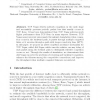Free Online Productivity Tools
i2Speak
i2Symbol
i2OCR
iTex2Img
iWeb2Print
iWeb2Shot
i2Type
iPdf2Split
iPdf2Merge
i2Bopomofo
i2Arabic
i2Style
i2Image
i2PDF
iLatex2Rtf
Sci2ools
114
click to vote
ICCNMC
2005
Springer
2005
Springer
An Aided Congestion Avoidance Mechanism for TCP Vegas
TCP Vegas detects network congestion in the early stage and successfully prevents periodic packet loss that usually occurs in TCP Reno. It has been demonstrated that TCP Vegas achieves much higher performance than TCP Reno in many aspects. However, TCP Vegas cannot prevent unnecessary throughput degradation when congestion occurs in the backward path, it passes through multiple congested links, or it reroutes through a path with longer round-trip time (RTT). In this paper, we propose an aided congestion avoidance mechanism for TCP Vegas, called Aid-Vegas, which uses the relative one-way delay of each packet along the forward path to distinguish whether congestion occurs or not. Through the results of simulation, we demonstrate that Aid-Vegas can solve the problems of rerouting and backward congestion, enhance the fairness among the competitive connections, and improve the throughput when multiple congested links are encountered.
Related Content
| Added | 27 Jun 2010 |
| Updated | 27 Jun 2010 |
| Type | Conference |
| Year | 2005 |
| Where | ICCNMC |
| Authors | Cheng-Yuan Ho, Chen-Hua Shih, Yaw-Chung Chen, Yi-Cheng Chan |
Comments (0)

